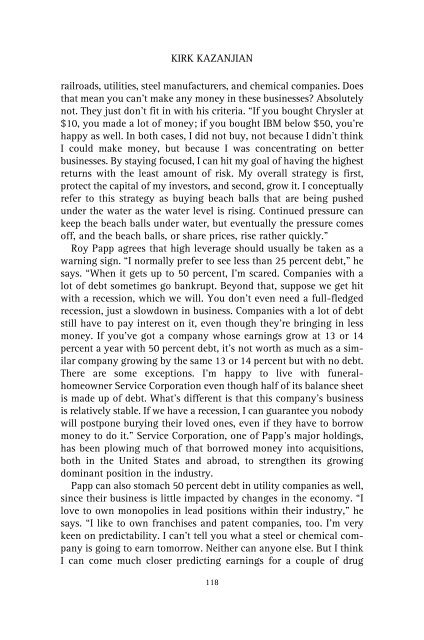You also want an ePaper? Increase the reach of your titles
YUMPU automatically turns print PDFs into web optimized ePapers that Google loves.
KIRK KAZANJIAN<br />
railroads, utilities, steel manufacturers, and chemical <strong>com</strong>panies. Does<br />
that mean you can’t make any money in these businesses? Absolutely<br />
not. They just don’t fit in with his criteria. “If you bought Chrysler at<br />
$10, you made a lot of money; if you bought IBM below $50, you’re<br />
happy as well. In both cases, I did not buy, not because I didn’t think<br />
I could make money, but because I was concentrating on better<br />
businesses. By staying focused, I can hit my goal of having the highest<br />
returns with the least amount of risk. My overall strategy is first,<br />
protect the capital of my investors, and second, grow it. I conceptually<br />
refer to this strategy as buying beach balls that are being pushed<br />
under the water as the water level is rising. Continued pressure can<br />
keep the beach balls under water, but eventually the pressure <strong>com</strong>es<br />
off, and the beach balls, or share prices, rise rather quickly.”<br />
Roy Papp agrees that high leverage should usually be taken as a<br />
warning sign. “I normally prefer to see less than 25 percent debt,” he<br />
says. “When it gets up to 50 percent, I’m scared. Companies with a<br />
lot of debt sometimes go bankrupt. Beyond that, suppose we get hit<br />
with a recession, which we will. You don’t even need a full-fledged<br />
recession, just a slowdown in business. Companies with a lot of debt<br />
still have to pay interest on it, even though they’re bringing in less<br />
money. If you’ve got a <strong>com</strong>pany whose earnings grow at 13 or 14<br />
percent a year with 50 percent debt, it’s not worth as much as a similar<br />
<strong>com</strong>pany growing by the same 13 or 14 percent but with no debt.<br />
There are some exceptions. I’m happy to live with funeralhomeowner<br />
Service Corporation even though half of its balance sheet<br />
is made up of debt. What’s different is that this <strong>com</strong>pany’s business<br />
is relatively stable. If we have a recession, I can guarantee you nobody<br />
will postpone burying their loved ones, even if they have to borrow<br />
money to do it.” Service Corporation, one of Papp’s major holdings,<br />
has been plowing much of that borrowed money into acquisitions,<br />
both in the United States and abroad, to strengthen its growing<br />
dominant position in the industry.<br />
Papp can also stomach 50 percent debt in utility <strong>com</strong>panies as well,<br />
since their business is little impacted by changes in the economy. “I<br />
love to own monopolies in lead positions within their industry,” he<br />
says. “I like to own franchises and patent <strong>com</strong>panies, too. I’m very<br />
keen on predictability. I can’t tell you what a steel or chemical <strong>com</strong>pany<br />
is going to earn tomorrow. Neither can anyone else. But I think<br />
I can <strong>com</strong>e much closer predicting earnings for a couple of drug<br />
118










